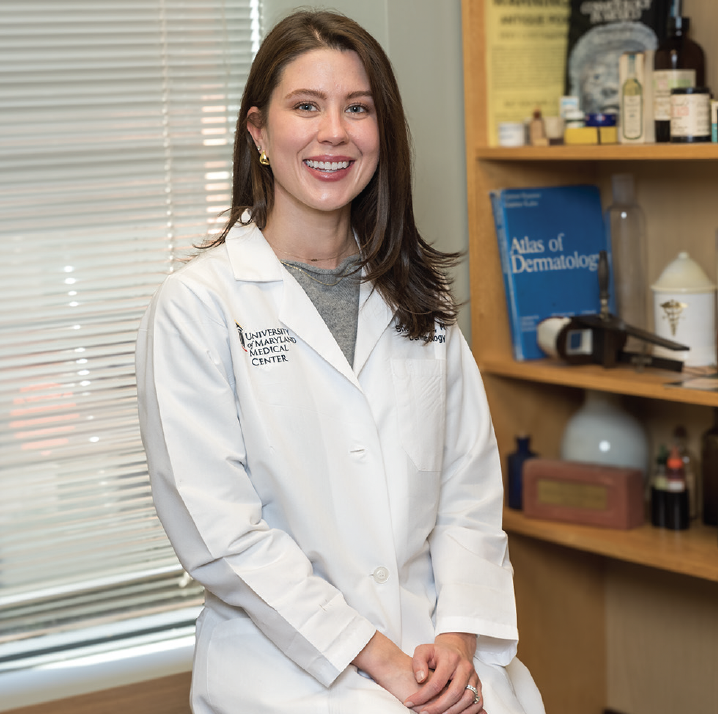Partner Content
“Yearly skin exams are a great way to ensure moles and skin growths remain healthy over time.”
Skin cancer is the most common form of cancer in the U.S., yet it is also one of the most preventable types. Below, Dr. Kristin Khan, a board-certified dermatologist at the University of Maryland, discusses the importance of annual skin checks, risk factors for developing skin cancer, and when to seek care.
What drew you to dermatology?
It is a unique and rewarding field – the conditions we treat are visible, which often has a profound impact on both physical health and emotional well-being. I also have the opportunity to care for a very diverse patient population as skin conditions can affect those of all ages and backgrounds.
It is incredibly fulfilling to not only improve health outcomes but also enhance my patients’ self-confidence and overall quality of life.
What are the most common skin conditions you see among patients?
Skin cancer is the most prevalent type of cancer in the United States, and I perform screening exams daily to check for both benign growths and skin cancer lesions. I also commonly treat a range of skin conditions that occur in children, adolescents, and adults including acne, rosacea, eczema, psoriasis, and hair loss.
Are annual skin checks necessary?
My colleagues and I often recommend a yearly skin exam as they are a great way for patients to ensure that their moles and skin growths remain healthy over time. Some patients may require screenings more or less often based on history and risk factors. It is important to tailor the schedule to each individual patient for appropriate monitoring and early cancer detection.

What can a patient expect during a skin cancer screening?
Patients will first be asked to provide their personal and family history of skin cancer, history of sunburns and tanning bed use, and if they have any moles or growths that are changing or concerning. A dermatology provider will then conduct a comprehensive check of the patient’s moles and skin growths from head-to-toe. A biopsy may be performed if a spot of concern is identified. The patient and provider will then decide when the next follow-up appointment should take place to ensure the moles and growths remain healthy over time.
If cancer or pre-cancer is discovered during the visit, what’s the next step?
If a suspected skin cancer is identified during the visit, a skin biopsy can be performed to confirm the diagnosis and guide the next steps in treatment. This is a minor procedure that is often performed the same day. Sometimes, pre-cancerous spots require a biopsy, but in other cases an in-office procedure or home treatment can be used to treat the spots before they become skin cancers.
What are the leading risk factors for skin cancer?
The leading risk factor is exposure to ultraviolet (UV) radiation, both from the natural sun and from artificial sources (such as tanning beds). Using broad-spectrum sunscreen, wearing sun-protective clothing, and seeking shade can help patients safely enjoy time outdoors—and skip artificial tanning! Additional risk factors for skin cancer may include family history, medications, or certain health conditions.
When should someone seek care for a dermatologic concern?
We counsel our patients on the “ABCDEs” which can help to identify a mole or growth that should be examined by a dermatologist: Asymmetry, irregular or blurry Border, changing or multiple Colors, a Diameter larger than a pencil eraser (6mm), and any Evolving or new growths. Additional warning signs include growths that itch, burn, bleed, or do not heal.
It’s important to remember that dermatologists treat far more than just skin cancers—whether it’s a rash, acne, or other skin concern, we can provide expert evaluation and personalized treatment plans.
What is your patient care philosophy?
My patient care philosophy is centered around building a partnership with each individual patient to help them achieve their treatment goals. I strive to build long-lasting and trusting relationships with my patients, which allows me to provide personalized care that evolves as their needs and concerns change over time. I recognize the unique impact that dermatologic care can have on both the physical and emotional well-being of patients, and it is a privilege to help them feel more confident and empowered in their skin.

KRISTIN L. KHAN, MD
Clinical Assistant Professor of Dermatology,
University of Maryland School of Medicine
Board-certified Dermatologist
Locations: Baltimore City, Columbia & Lutherville (opening in 2025)
667-214-1171 | umfpi.org/dermatology

